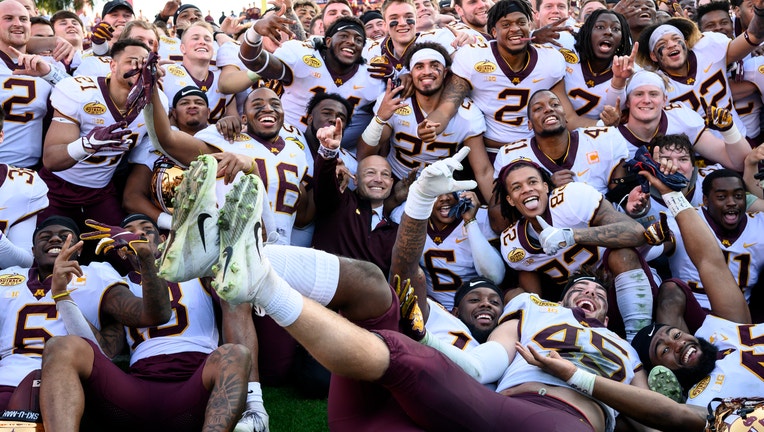'How bizarre would that be?' ESPN's Kirk Herbstreit talks chances of spring football season

TAMPA, FL - JANUARY 1: The Minnesota Gophers posed for their team photo after defeating the Auburn Tigers in the Outback Bowl on Wednesday, Jan. 1, 2020 at Raymond James Stadium in Tampa, Fla. (Photo by Aaron Lavinsky/Star Tribune via Getty Images) (Getty Images)
MINNEAPOLIS - The Coronavirus pandemic has changed the entire landscape of sports, and if the NCAA doesn’t hear some good news soon, the college football season will have to be adjusted.
It will bring an entirely different meaning to the concept of spring football. This year’s spring practices and spring games were canceled across the country, and at Minnesota, P.J. Fleck and the Gophers got a week’s worth of practices in before everything got shut down.
If a normal college football season is to transpire, athletes would have to be back on their campuses with summer workouts taking place by sometime in July. But there’s nothing currently to suggest that will actually happen.
ESPN college football analyst Kirk Herbstreit, on a national conference call Monday for the NFL Draft, says there are three or four scenarios in place as officials gather more and new data to make a decision on the season. One such scenario is starting the regular season in January or February of 2021, with the postseason starting in June.
“They’re going to do everything that they can, if it comes to that extreme, to be able to potentially have a 2020 season. A lot of it is still kind of a feeling out process,” Herbstreit said. "We’re all in uncharted waters. We’re in a world that we’re trying to adjust every day to in quarantine. If it means we have to push it back to starting in December, starting in January, starting in February or March, then so be it. That’s what has to happen."
That comes after telling Ian Fitzsimmons on ESPN Radio back in late March, “We may not even have football.” It’s something Herbstreit says was taken out of context.
“I’m not making any predictions, I really wasn’t that night, I was just trying to explain how real this pandemic is and how we all need to listen to the guidelines and what they’re recommending,” Herbstreit said.
Most that are involved in the decision-making process are confident that there will be a college football season, but it will likely be altered. According to Brett McMurphy with Stadium sports network, a survey of 130 Division I athletic directors shows 99 percent of them believe there will be football, but 75 percent of them think the season will be delayed. About 60 percent think football will start in October or November, while 14 percent think it will have to wait in the spring.
It’s hard to think of football as a spring sport for the NCAA.
“How bizarre would that be? The spring is when we get the baseball bats out and I watch the Reds. I watch college baseball, I’m a baseball junkie. It just goes to show you how far we are willing to go to get our football. I think it would be weird to watch spring football,” Herbstreit said.
Stewart Mandel of The Athletic proposes a scenario where the college football season starts on New Year’s Day, with a combo of playoff games and the NCAA Final Four on the same weekend. Most regular season games would be played in domes.
Adam Rittenberg, who covers the Big Ten for ESPN, said an idea is being discussed for the Big Ten to have its games split between indoor sites in Indianapolis, Minneapolis, Milwaukee and St. Louis.
If the football season gets pushed back to the spring, some players will have decisions to make. Play the spring season and risk getting hurt before the NFL Draft, or sit out and focus on your professional future?
The concept of a delayed season is a tough pill to swallow for Fleck and the Gophers. They’re coming off an 11-2 season, the program’s best in 115 years, and beating Auburn in the Outback Bowl.
Nobody knows anything for now, and we sit and wait.

